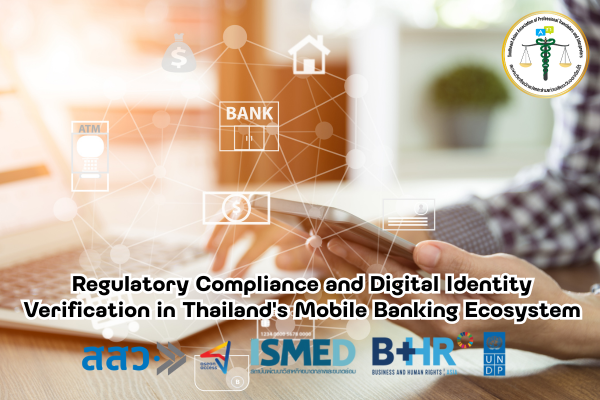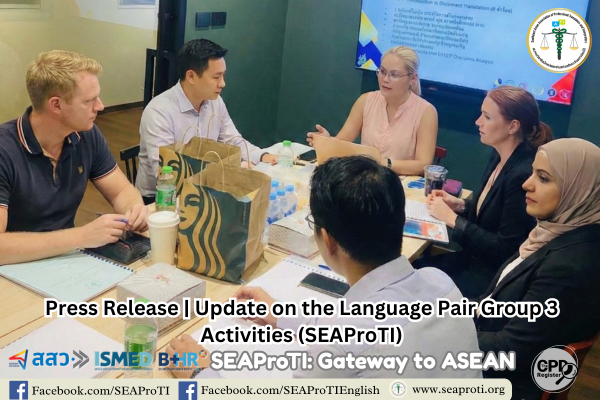Regulatory Compliance and Digital Identity Verification in Thailand’s Mobile Banking Ecosystem
29 April 2025, Bangkok – This article examines the recent regulatory measures initiated by the Thai government aimed at strengthening digital identity verification processes within the mobile banking ecosystem. In response to increasing technology-related crimes, the Ministry of Digital Economy and Society has mandated a comprehensive verification of mobile numbers registered since January 1, 2022. The analysis explores the objectives, procedural implementation, potential consequences for non-compliance, and broader implications for financial and digital security frameworks in Thailand.
Introduction
In an era of escalating cybercrime and digital fraud, governments worldwide are intensifying regulatory mechanisms to safeguard electronic transactions. Thailand, recognizing the vulnerabilities associated with mobile banking services, has launched a nationwide initiative to verify mobile number registrations linked to banking applications. Ordered by Prasert Jantararuangtong, the Minister of Digital Economy and Society, this initiative underscores the state’s commitment to enhancing digital security and ensuring the integrity of mobile financial services.
Regulatory Framework and Scope
Introduced on February 1, 2025, the regulation targets approximately 700,000 mobile numbers registered from January 1, 2022, onward. The central requirement is the alignment of user information: the personal details registered for mobile services must correspond precisely with those registered for mobile banking services.
Additionally, the initiative addresses a broader issue—an estimated 1.8 million mobile numbers in Thailand currently lack any form of user registration. This highlights significant systemic gaps in the country’s digital identity management and reinforces the necessity of regulatory interventions.
Implementation and Compliance Mechanism
The regulatory framework stipulates a deadline of April 30, 2025, for affected users to rectify inconsistencies. Failure to comply will result in the suspension of mobile banking services beginning in June 2025.
To facilitate compliance, banks have been instructed to directly contact customers whose mobile number registrations do not match their banking records. These customers are urged to update their information promptly. Customers who do not receive communication from their banks are presumed to have compliant records and may continue using mobile banking services without interruption.
Rationale Behind the Regulatory Measures
The primary rationale for this sweeping verification process is the prevention of technology-related crimes, including but not limited to:
- Identity theft
- Unauthorized financial transactions
- Cyber fraud involving unregistered or fraudulently registered mobile numbers
By ensuring that mobile banking accounts are linked to verifiable, correctly registered mobile numbers, authorities aim to reduce opportunities for illicit activities and strengthen public trust in the financial system.
Potential Challenges and Considerations
While the initiative is a significant step towards enhanced digital security, it poses several challenges:
- Access and Awareness: Users in remote or underserved areas may have limited access to update their information promptly.
- Operational Load: Banks and telecommunications providers must manage a considerable administrative burden in verifying and updating user records.
- Privacy Concerns: Increased data scrutiny raises issues regarding the protection of personal information under Thailand’s data privacy laws.
Thus, the success of the initiative will depend on efficient execution, widespread public communication, and strict adherence to privacy and data protection standards.
Conclusion
Thailand’s mobile number verification initiative represents a critical advancement in the regulation of digital financial services. By aligning mobile registration with mobile banking credentials, the government seeks to erect stronger barriers against cybercrime. However, careful implementation and sensitivity to users’ rights will be necessary to ensure that these measures not only enhance security but also uphold public confidence in the country’s evolving digital economy.
The April 30 compliance deadline serves as a pivotal moment for users to act, reinforcing the essential connection between digital security and responsible identity management in the modern banking environment.
SEAProTI’s certified translators, translation certification providers, and certified interpreters:
The Southeast Asian Association of Professional Translators and Interpreters (SEAProTI) has officially announced the criteria and qualifications for individuals to register as “Certified Translators,” “Translation Certification Providers,” and “Certified Interpreters” under the association’s regulations. These guidelines are detailed in Sections 9 and 10 of the Royal Thai Government Gazette, issued by the Secretariat of the Cabinet under the Office of the Prime Minister of the Kingdom of Thailand, dated July 25, 2024, Volume 141, Part 66 Ng, Page 100.
To read the full publication, visit: the Royal Thai Government Gazette
การตรวจสอบข้อมูลและการยืนยันตัวตนในระบบธนาคารบนมือถือของประเทศไทย: ก้าวใหม่เพื่อความมั่นคงทางดิจิทัล
29 เมษายน 2568, กรุงเทพมหานคร – บทความนี้วิเคราะห์มาตรการกำกับดูแลล่าสุดของรัฐบาลไทย ที่มุ่งยกระดับกระบวนการยืนยันตัวตนดิจิทัลในระบบธนาคารผ่านโทรศัพท์มือถือ ท่ามกลางสถานการณ์อาชญากรรมทางเทคโนโลยีที่เพิ่มขึ้น กระทรวงดิจิทัลเพื่อเศรษฐกิจและสังคมได้ออกคำสั่งให้มีการตรวจสอบหมายเลขโทรศัพท์มือถือที่ลงทะเบียนตั้งแต่วันที่ 1 มกราคม พ.ศ. 2565 เป็นต้นมา เพื่อให้ข้อมูลผู้ใช้ในระบบธนาคารสอดคล้องกับข้อมูลผู้ใช้โทรศัพท์ บทความนี้พิจารณาเป้าหมาย ขั้นตอนการดำเนินงาน ผลกระทบที่อาจเกิดขึ้นจากการไม่ปฏิบัติตาม และความหมายในระดับระบบต่อความปลอดภัยทางการเงินและดิจิทัลของประเทศ
บทนำ
ในยุคที่อาชญากรรมไซเบอร์และการฉ้อโกงดิจิทัลเพิ่มสูงขึ้นอย่างรวดเร็ว หลายประเทศทั่วโลกต่างออกมาตรการควบคุมเพื่อปกป้องธุรกรรมอิเล็กทรอนิกส์ รัฐบาลไทยตระหนักถึงช่องโหว่ของบริการธนาคารผ่านมือถือ จึงได้ประกาศใช้มาตรการตรวจสอบหมายเลขโทรศัพท์มือถือทั่วประเทศ เพื่อยกระดับความปลอดภัยและความน่าเชื่อถือของบริการการเงินดิจิทัล โดยมีนายประเสริฐ จันทรรวงทอง รัฐมนตรีว่าการกระทรวงดิจิทัลเพื่อเศรษฐกิจและสังคม เป็นผู้ผลักดัน
ขอบเขตและกรอบกฎหมาย
กฎระเบียบที่ประกาศใช้เมื่อวันที่ 1 กุมภาพันธ์ พ.ศ. 2568 มีเป้าหมายในการตรวจสอบหมายเลขโทรศัพท์มือถือประมาณ 700,000 หมายเลข ที่ลงทะเบียนตั้งแต่วันที่ 1 มกราคม พ.ศ. 2565 เป็นต้นมา โดยกำหนดให้ข้อมูลที่ใช้ลงทะเบียนเบอร์โทรศัพท์ต้องตรงกับข้อมูลที่ใช้ในบัญชีธนาคารบนมือถืออย่างเคร่งครัด
นอกจากนี้ รัฐบาลยังพบว่ามีหมายเลขโทรศัพท์ที่ไม่มีการลงทะเบียนเลยมากถึง 1.8 ล้านหมายเลข ซึ่งตอกย้ำถึงความจำเป็นของการดำเนินมาตรการนี้อย่างเร่งด่วน
ขั้นตอนการดำเนินงานและแนวทางปฏิบัติตามกฎหมาย
ผู้ใช้งานที่ได้รับผลกระทบจะต้องดำเนินการแก้ไขข้อมูลให้ถูกต้องภายในวันที่ 30 เมษายน 2568 มิฉะนั้น บริการธนาคารบนมือถือของตนอาจถูกระงับการใช้งานตั้งแต่เดือน มิถุนายน 2568 เป็นต้นไป
ธนาคารได้รับคำสั่งให้ติดต่อผู้ใช้งานที่มีข้อมูลไม่ตรงกันโดยตรง เพื่อแจ้งให้ดำเนินการอัปเดตข้อมูล ส่วนผู้ที่ไม่ได้รับการติดต่อถือว่าข้อมูลของตนถูกต้องและสามารถใช้งานต่อได้ตามปกติ
เหตุผลเบื้องหลังนโยบายนี้
วัตถุประสงค์หลักของมาตรการนี้คือการป้องกันอาชญากรรมทางเทคโนโลยี โดยเฉพาะ:
- การขโมยข้อมูลประจำตัว (Identity Theft)
- การทำธุรกรรมโดยไม่ได้รับอนุญาต
- การฉ้อโกงผ่านหมายเลขโทรศัพท์ที่ไม่ได้ลงทะเบียนอย่างถูกต้อง
- การเชื่อมโยงข้อมูลหมายเลขโทรศัพท์กับบัญชีธนาคารอย่างแม่นยำจะช่วยลดโอกาสในการก่ออาชญากรรม และเสริมสร้างความไว้วางใจต่อระบบการเงินของประเทศ
ความท้าทายและข้อควรระวัง
แม้มาตรการนี้จะเป็นก้าวสำคัญต่อความมั่นคงทางดิจิทัล แต่ก็มีข้อท้าทายที่ควรพิจารณา:
- การเข้าถึงและความรู้ความเข้าใจของประชาชน: ผู้ใช้งานในพื้นที่ห่างไกลอาจประสบปัญหาในการอัปเดตข้อมูล
- ภาระงานของหน่วยงาน: ธนาคารและผู้ให้บริการโทรศัพท์ต้องรับภาระด้านการตรวจสอบและอัปเดตข้อมูลจำนวนมาก
- ข้อกังวลด้านความเป็นส่วนตัว: การตรวจสอบข้อมูลในระดับนี้อาจกระทบต่อสิทธิความเป็นส่วนตัว หากไม่มีการคุ้มครองข้อมูลที่เหมาะสม
ความสำเร็จของมาตรการนี้จึงขึ้นอยู่กับการบริหารจัดการที่มีประสิทธิภาพ การสื่อสารต่อสาธารณะอย่างทั่วถึง และการปฏิบัติตามกฎหมายคุ้มครองข้อมูลส่วนบุคคลอย่างเคร่งครัด
บทสรุป
การตรวจสอบและยืนยันตัวตนในระบบธนาคารผ่านมือถือของประเทศไทยครั้งนี้ ถือเป็นความก้าวหน้าสำคัญในการยกระดับมาตรฐานด้านความปลอดภัยทางการเงิน โดยการบังคับให้ข้อมูลลงทะเบียนโทรศัพท์ต้องสอดคล้องกับบัญชีธนาคาร จะช่วยลดช่องว่างของอาชญากรรมไซเบอร์ในระดับระบบ
อย่างไรก็ตาม ความสำเร็จของมาตรการนี้ต้องอาศัยการดำเนินงานอย่างรัดกุม โปร่งใส และคำนึงถึงสิทธิของผู้ใช้งานในทุกขั้นตอน โดยกำหนดเส้นตาย 30 เมษายน 2568 เป็นหมุดหมายสำคัญที่ทุกฝ่ายต้องเร่งดำเนินการให้แล้วเสร็จ
เกี่ยวกับนักแปลรับรอง ผู้รับรองการแปล และล่ามรับรองของสมาคมวิชาชีพนักแปลและล่ามแห่งเอเชียตะวันออกเฉียงใต้
สมาคมวิชาชีพนักแปลและล่ามแห่งเอเชียตะวันออกเฉียงใต้ (SEAProTI) ได้ประกาศหลักเกณฑ์และคุณสมบัติผู้ที่ขึ้นทะเบียนเป็น “นักแปลรับรอง (Certified Translators) และผู้รับรองการแปล (Translation Certification Providers) และล่ามรับรอง (Certified Interpreters)” ของสมาคม หมวดที่ 9 และหมวดที่ 10 ในราชกิจจานุเบกษา ของสำนักเลขาธิการคณะรัฐมนตรี ในสำนักนายกรัฐมนตรี แห่งราชอาณาจักรไทย ลงวันที่ 25 ก.ค. 2567 เล่มที่ 141 ตอนที่ 66 ง หน้า 100 อ่านฉบับเต็มได้ที่: นักแปลรับรอง ผู้รับรองการแปล และล่ามรับรอง

























